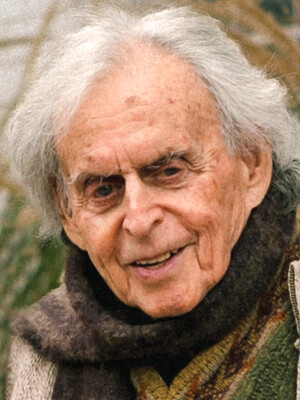SOURCE: YALE
Robert Louis Jackson, B. E. Bensinger Professor of Slavic Languages and Literatures, Emeritus, an internationally renowned scholar of the Russian novel and short story of the 19th and early 20th century and one of the five founders of Yale’s Department of Slavic Languages and Literatures, died at Yale New Haven Hospital on May 3. He was 98.
Jackson was drawn to Russian literature because, as he wrote, “the intense ethical and social concerns of the great Russian novelists and poets never seemed to involve any compromise with their artistry or artistic truth.”
He is most famous for his groundbreaking books on Fyodor Dostoevsky, especially “Dostoevsky’s Quest for Form: A Study of His Philosophy of Art” (1966), “The Art of Dostoevsky: Deliriums and Nocturnes” (1981) and “Dialogues with Dostoevsky: The Overwhelming Questions” (1993). Minutely attentive to the linguistic texture and aesthetic form, these masterful studies delved deeply into the spiritual and philosophical dimensions of Dostoevsky’s art. With passion and insight, they explore the questions of freedom and responsibility, fate and free will, chance and design, about which Jackson cared as deeply as did his favorite Russian authors.
Insight, elegance, and analytic rigor similarly distinguish Jackson’s studies of other major Russian writers — Pushkin, Gogol, Turgenev, Tolstoy, Vyacheslav Ivanov, Gorky, Solzhenitsyn — whom he tended to put in comparative illuminations with classical European literature. Later in his career, he moved away from the big frenetic novels of Dostoevsky and Tolstoy to the master of small form of the short story, producing luminous readings of the fiction of Anton Chekhov, whose quiet humanism was close to Jackson’s own. Jackson’s posthumous book, “Essays on Anton P. Chekhov: Close Readings by Robert Louis Jackson” (ed. Cathy Popkin), which follows several brilliant articles and two edited volumes on Chekhov, including “Reading Chekhov’s Texts” (1993), will be published soon by Academic Studies Press. This collection will close six decades of prodigious research and writing — spanning six monographs, seven edited volumes, and over a hundred articles — that left an indelible mark on the Slavic field.
Jackson did much to make Yale a vibrant international center of research in Russian literature through his annual Yale Conferences in Slavic Languages and Literatures (1980-2000). They brought together American and European scholars, junior and senior, and typically concluded in the convivial atmosphere of the Guilford home of Jackson and his wife, the artist Leslie Jackson. In the 1970s and 1980s, Jackson connected international communities of Slavists — among whom few bridges then existed — by becoming founder and president of the International Dostoevsky Society and International Chekhov Society (he also served as president of the North American chapters of these societies).
His formidable scholarly achievements and service to the field were recognized by the Guggenheim Fellowship, the National Endowment for the Arts Fellowship, the Alexander von Humboldt-Stiftung Fellowship, and the Distinguished Scholarly Career Award from the American Association of Teachers of Slavic and East European Languages, which also awarded him a book prize for “Dialogues with Dostoevsky.” Jackson also received honorary doctorates from Moscow State University and the Petrozavodsk State University, Russia.
Born in 1923 in New York City to parents who had emigrated from Germany and the Austro-Hungarian Empire, Jackson found his passion for Russian culture during World War II, eventually earning degrees from Cornell and Columbia Universities, and the University of California, Berkeley. He was brought to Yale by Reneé Wellek in 1954 and remained on the faculty until his retirement in 2002. A mesmerizing teacher, a devoted mentor, and a supportive colleague, Jackson is revered and fondly remembered by those he inspired with his love for Russian literature, genuine intellectual generosity, and profound humanity.
He is survived by his daughters, Emily Robin Jackson and Kathy Allen Jackson, their spouses, and by grandchildren and great-grandchildren. A public memorial service will take place at a later date, and will be connected with the publication of Jackson’s last book, “Essays on Anton P. Chekhov.”

